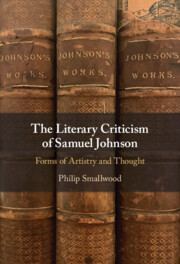Book contents
- The Literary Criticism of Samuel Johnson
- The Literary Criticism of Samuel Johnson
- Copyright page
- Dedication
- Epigraph
- Contents
- Preface
- Acknowledgments
- Abbreviations
- Introduction
- Part I Johnson’s Criticism and the Forms of Feeling
- Chapter 1 Johnson’s Compassion
- Chapter 2 “The tears stand in my eyes”
- Part II Critical Relations and the Art of Literary History
- Part III Johnson, Dramatic Poetry and Thinking
- Part IV Time, Truth and History
- Part V Editing Lives, and Life
- Appendix Irony in Revolt: F. R. Leavis Reads Johnson
- Bibliography
- Index
Chapter 2 - “The tears stand in my eyes”
Johnson and Emotion
from Part I - Johnson’s Criticism and the Forms of Feeling
Published online by Cambridge University Press: 07 September 2023
- The Literary Criticism of Samuel Johnson
- The Literary Criticism of Samuel Johnson
- Copyright page
- Dedication
- Epigraph
- Contents
- Preface
- Acknowledgments
- Abbreviations
- Introduction
- Part I Johnson’s Criticism and the Forms of Feeling
- Chapter 1 Johnson’s Compassion
- Chapter 2 “The tears stand in my eyes”
- Part II Critical Relations and the Art of Literary History
- Part III Johnson, Dramatic Poetry and Thinking
- Part IV Time, Truth and History
- Part V Editing Lives, and Life
- Appendix Irony in Revolt: F. R. Leavis Reads Johnson
- Bibliography
- Index
Summary
This chapter turns to the emotional sources of Johnson’s poetical criticism. The chapter examines the contrast between Johnson’s response to the overblown dramas of Dryden and his enthusiasm for the power of Alexander’s Feast (1697). Attention then moves to Johnson’s taste for poetry deriving from genuine sorrow when this is compared with the confected grievings of Milton’s Lycidas. But Johnson’s emotional consciousness eschews excess. His neo-Latin verse, for example, seems to shield Johnson from memories that might be too painful to express in English. Reinforcing this vulnerability are Johnson’s emotional state on the death of his wife and his disordered feelings at the news of the widowed Mrs. Thrale’s marriage to Piozzi. Unbearable loss is then explored by reference to a scene from Rasselas and through a passage from the Preface to Shakespeare on tragedy. The deaths of Shakespeare’s heroines caused him intense pain; the combination of tragic with comic scenes as “mingled” drama supplied its own intensity, as Hamlet illustrates.
- Type
- Chapter
- Information
- The Literary Criticism of Samuel JohnsonForms of Artistry and Thought, pp. 34 - 52Publisher: Cambridge University PressPrint publication year: 2023

